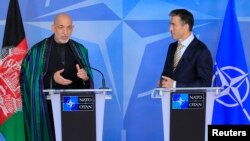BRUSSELS, BELGIUM —
NATO Secretary General Anders Fogh Rasmussen told Afghanistan's president Tuesday that his government must follow through on a series of reform plans to ensure that Western support continues beyond next year, when most foreign troops will leave the country. The two leaders met in Brussels during a NATO foreign ministers' meeting.
Rasmussen said he and Afghan President Hamid Karzai can deliver tough messages to each other, but still remain on friendly terms. He seems to have had such a message on Tuesday, telling reporters that while NATO plans to fulfill its long-term commitments to Afghanistan, that country also has a role to play.
“Their continued efforts to meet their commitments will pave the way for our continued support,” he said.
Rasmussen said those commitments include fighting corruption, holding credible elections next year and respecting Human Rights, including women's rights.
Setting expectations
NATO has not yet said how many troops it wants to leave in Afghanistan after next year, and negotiations on immunity for those forces and related issues are ongoing. But U.S. Secretary of State John Kerry said at least one thing about the plan is clear.
“It is clear what the mission is. The mission will be to support, advise, train the Afghan military on an ongoing basis, as well as to engage in counter-terrorism activity,” he said.
The Afghan president thanked NATO for training and equipping his forces, and expressed confidence that they will be ready to take full security responsibility when most of the foreign troops depart.
“Afghanistan, Mr. Secretary General, will definitely be able to provide for the security of the Afghan people. The Afghan people will be providing the protection of the Afghan people and the territory of Afghanistan with the forces of our own country,” said Karzai.
But not everyone at NATO is so confident, and officials want a robust foreign presence after 2014 to help. If the effort fails, the key goal of preventing Afghanistan from again becoming a haven for terrorists could be in jeopardy.
Gaining Pakistan's support
Another key element in the plan is cooperation from Pakistan, which has been inconsistent over the nearly 12 years of the Afghan war. Kerry will host a meeting Wednesday between Karzai and senior Pakistani officials. Rasmussen welcomed the effort and spoke frankly about the problem.
“It is a problem, and we have to face that. It is a problem that terrorists can cross the border, conduct terrorist acts in Afghanistan and then seek sanctuaries, safe havens, in Pakistan,” said Rasmussen.
Rasmussen said the porous Afghan-Pakistan border hurts all the efforts to improve security in the region, and also hurts both countries' common interest in fighting extremists.
No breakthrough is expected at Wednesday's meeting, but officials say keeping the dialogue alive, and at a high level, is essential to make even incremental progress.
Rasmussen said he and Afghan President Hamid Karzai can deliver tough messages to each other, but still remain on friendly terms. He seems to have had such a message on Tuesday, telling reporters that while NATO plans to fulfill its long-term commitments to Afghanistan, that country also has a role to play.
“Their continued efforts to meet their commitments will pave the way for our continued support,” he said.
Rasmussen said those commitments include fighting corruption, holding credible elections next year and respecting Human Rights, including women's rights.
Setting expectations
NATO has not yet said how many troops it wants to leave in Afghanistan after next year, and negotiations on immunity for those forces and related issues are ongoing. But U.S. Secretary of State John Kerry said at least one thing about the plan is clear.
“It is clear what the mission is. The mission will be to support, advise, train the Afghan military on an ongoing basis, as well as to engage in counter-terrorism activity,” he said.
The Afghan president thanked NATO for training and equipping his forces, and expressed confidence that they will be ready to take full security responsibility when most of the foreign troops depart.
“Afghanistan, Mr. Secretary General, will definitely be able to provide for the security of the Afghan people. The Afghan people will be providing the protection of the Afghan people and the territory of Afghanistan with the forces of our own country,” said Karzai.
But not everyone at NATO is so confident, and officials want a robust foreign presence after 2014 to help. If the effort fails, the key goal of preventing Afghanistan from again becoming a haven for terrorists could be in jeopardy.
Gaining Pakistan's support
Another key element in the plan is cooperation from Pakistan, which has been inconsistent over the nearly 12 years of the Afghan war. Kerry will host a meeting Wednesday between Karzai and senior Pakistani officials. Rasmussen welcomed the effort and spoke frankly about the problem.
“It is a problem, and we have to face that. It is a problem that terrorists can cross the border, conduct terrorist acts in Afghanistan and then seek sanctuaries, safe havens, in Pakistan,” said Rasmussen.
Rasmussen said the porous Afghan-Pakistan border hurts all the efforts to improve security in the region, and also hurts both countries' common interest in fighting extremists.
No breakthrough is expected at Wednesday's meeting, but officials say keeping the dialogue alive, and at a high level, is essential to make even incremental progress.




